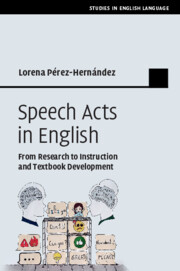Book contents
- Speech Acts in English
- Studies in English Language
- Speech Acts in English
- Copyright page
- Dedication
- Contents
- Figures
- Tables
- Acknowledgements
- Abbreviations
- 1 Introduction
- 2 What Contemporary Research Tells Us about Speech Acts
- 3 Critical Assessment of the Representation of Speech Acts in Advanced EFL Textbooks
- 4 A Cognitive Pedagogical Grammar of Directive Speech Acts I: Know-What and Know-How of Directives
- 5 A Cognitive Pedagogical Grammar of Directive Speech Acts II: Activities and Practice Materials
- 6 Conclusions
- References
- Index
2 - What Contemporary Research Tells Us about Speech Acts
Published online by Cambridge University Press: 16 November 2020
- Speech Acts in English
- Studies in English Language
- Speech Acts in English
- Copyright page
- Dedication
- Contents
- Figures
- Tables
- Acknowledgements
- Abbreviations
- 1 Introduction
- 2 What Contemporary Research Tells Us about Speech Acts
- 3 Critical Assessment of the Representation of Speech Acts in Advanced EFL Textbooks
- 4 A Cognitive Pedagogical Grammar of Directive Speech Acts I: Know-What and Know-How of Directives
- 5 A Cognitive Pedagogical Grammar of Directive Speech Acts II: Activities and Practice Materials
- 6 Conclusions
- References
- Index
Summary
Chapter 2 provides an accessible outlook on contemporary research on speech acts, explaining and illustrating the latest pragmatic, functional, conversational, and cognitive/constructional contributions to the understanding of illocutionary acts. The chapter advocates a contrastive, cognitive/constructional theory of speech acts, showing how this approach is capable of integrating pragmatic, semantic, and formal aspects of speech acts into a unified and comprehensive account that is compatible with current psycholinguistic knowledge on speech acts production and understanding. This chapter sets the theoretical foundations for Chapters 4 and 5, offering a fully-fledged theoretical proposal on the semantic and formal features of directive speech acts in terms of illocutionary constructions and metonymic operations. The semantic side of the constructions is captured in the form of illocutionary ICMs, and the formal side takes the form of inventories of base constructions and linguistic realisation procedures. It is further argued that speakers can modulate the explicitness of their directive speech acts through (multiple-source)-in-target metonymies.
- Type
- Chapter
- Information
- Speech Acts in EnglishFrom Research to Instruction and Textbook Development, pp. 16 - 68Publisher: Cambridge University PressPrint publication year: 2020



